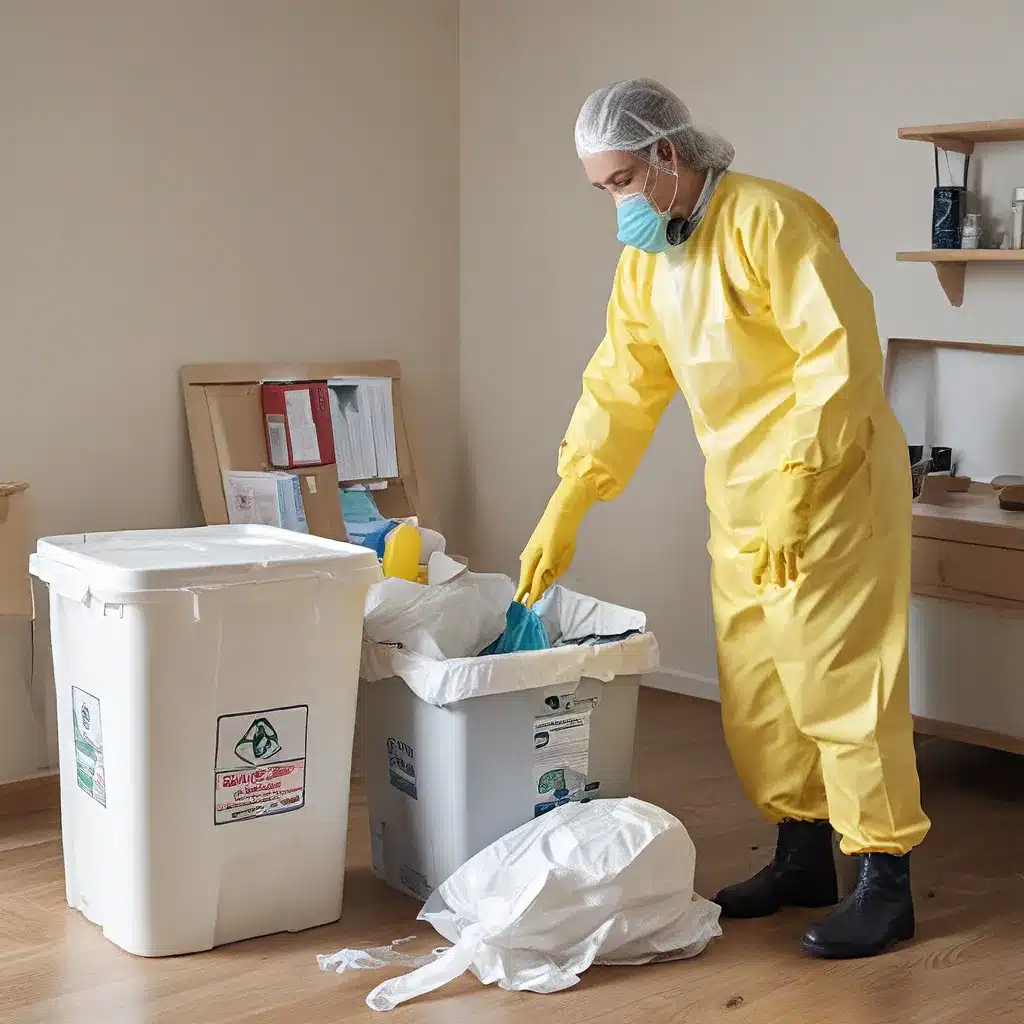As someone who’s been through my fair share of household mishaps, I can attest that dealing with medical waste and biohazards at home is no walk in the park. It’s a delicate situation that requires a steady hand and a cool head. But don’t worry, I’m here to guide you through the process, step by step, so you can tackle those tricky situations like a pro.
Understanding the Risks
Let’s start with the basics – medical waste and biohazards are no laughing matter. These materials can harbor all sorts of nasty bugs and bacteria that can make you seriously ill. We’re talking about things like used syringes, bandages, and even bodily fluids. Yikes! If not handled properly, these items can put you, your family, and even your furry friends at risk.
But fear not, my friends. The good news is that there are strict regulations in place to ensure the safe disposal of these materials, both in medical facilities and at home. The California Department of Public Health and the Environmental Protection Agency have laid out clear guidelines to help us keep our homes and communities safe.
Identifying Medical Waste
Okay, so what exactly qualifies as medical waste and biohazards in a home setting? Well, it’s not just the obvious stuff like used needles and bandages. Anything that’s been contaminated with bodily fluids, including things like cotton balls, tissues, and even feminine hygiene products, can be considered a biohazard. And let’s not forget about the random cuts, scrapes, and other injuries that can happen around the house – those can also produce medical waste that needs to be handled with care.
It’s important to be vigilant and keep an eye out for these items, especially in homes with young children or elderly family members. You’d be surprised how quickly those little paper cuts and nosebleeds can add up!
Proper Disposal Techniques
Now that we’ve identified the potential hazards, let’s talk about how to safely dispose of them. The key is to use the proper containers and follow the right procedures. For example, the state of Florida recommends using a sturdy, leak-proof container with a tight-fitting lid for all your medical waste. And when it comes time to get rid of it, you’ll want to contact a registered biomedical waste transporter to handle the job.
But what if you’re in a pinch and don’t have access to a biomedical waste service? Well, the EPA suggests that you can safely dispose of small amounts of medical waste in your regular household trash, as long as it’s contained in a sealed, leak-proof bag or container. Just make sure to label it clearly as “biohazard” or “medical waste” to avoid any confusion.
And let’s not forget about personal protective equipment (PPE) – things like gloves and masks. These should always be treated as medical waste, even if they’re not visibly contaminated. Better safe than sorry, right?
Cleaning and Decontamination
Okay, so you’ve properly disposed of the medical waste – now what? Well, the next step is to make sure your living space is clean and decontaminated. This is crucial, especially if you’ve had a major medical incident like a bloody nose or a traumatic injury.
According to the Florida Department of Health, you’ll want to use a disinfectant that’s approved for use against bloodborne pathogens. Bleach-based solutions are a great option, but be sure to follow the manufacturer’s instructions carefully. And don’t forget to wear those gloves and masks again – you can never be too cautious when it comes to medical waste!
Once you’ve thoroughly cleaned the area, it’s a good idea to keep a close eye on it for any signs of contamination. If you notice anything suspicious, don’t hesitate to contact a professional for help. They’ll be able to assess the situation and ensure that everything is properly contained and disposed of.
Staying Safe and Informed
At the end of the day, safely handling medical waste and biohazards at home is all about being proactive, vigilant, and responsible. It’s not the most glamorous topic, but it’s an important one that can have serious consequences if not taken seriously.
Remember, the key is to know the risks, identify the hazards, and follow the proper procedures. And if you’re ever unsure, don’t be afraid to reach out to the experts. The Florida Department of Health has a great hotline where you can get all the information you need.
Oh, and speaking of information, did you know that the experts at Adam Cleaning are also trained in medical waste management? Yep, they’ve got the skills and the know-how to handle even the trickiest of biohazards. So if you’re ever feeling overwhelmed, don’t hesitate to give them a call. They’ll be there to lend a helping hand (and a hazmat suit!) whenever you need it.
Now, go forth and conquer those medical waste challenges, my friends! With a little bit of knowledge and a whole lot of caution, you’ll be a master of medical waste management in no time.







